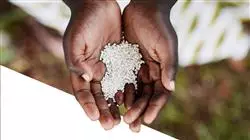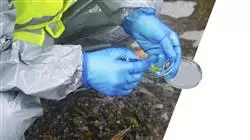University certificate
The world's largest faculty of law”
Introduction to the Program
Delve into the rights and obligations of States in the field of asylum and refuge through this 100% online university program"

The promotion of Human Rights implies the elimination of barriers that impede sustainable development, such as discrimination, exclusion and violence. In this context, the rights of indigenous peoples are of particular relevance, as they have historically been marginalized and their rights to land, culture and self-determination have been the object of constant struggles and demands. In this sense, the recognition of their cultural richness and their own development model would favor their growth as an independent society. Even so, they are villages with a high rate of poverty and are affected by constant discrimination.
On the other hand, the struggle of the LGTBIQ+ communities has gained greater relevance in recent years, also favoring a change in heteronormative and patriarchal roles. As a result, same-sex marriage has been legalized in several countries, and cases of workplace harassment and domestic violence have become more visible. However, there are still significant challenges in many parts of the world in terms of equal rights and recognition of sexual and gender diversity.
Finally, various factors, such as the economic crisis and armed conflicts, have led to an increase in migratory flows and the forced displacement of people. This has become a major issue in the most important international organizations, since we are facing a great challenge: to find a balance between the adequate protection of migrants' human rights and regulating access to host societies.
In view of the above, it is undeniable the need for highly trained professionals in these issues, who can ensure the safety of the most vulnerable and promote new measures to protect them. With this in mind, TECH has designed an academic program through which the students will delve into the most relevant concepts in the area. All this, contained in a syllabus designed under the most rigorous criteria and by professionals of great prestige.
Strengthen your skills in law and contribute to the development of the most vulnerable indigenous peoples"
This Postgraduate diploma in Human Rights Protection of Vulnerable Groups contains the most complete and up-to-date program on the market. The most important features include:
- The development of case studies presented by experts in the legal field
- The graphic, schematic, and practical contents with which they are created, provide practical information on the disciplines that are essential for professional practice
- Practical exercises where the self-assessment process can be carried out to improve learning
- Its special emphasis on innovative methodologies
- Theoretical lessons, questions to the expert, debate forums on controversial topics, and individual reflection assignments
- Content that is accessible from any fixed or portable device with an Internet connection
Enroll now and complete your professional profile thanks to the most innovative educational methodology, Relearning"
The program’s teaching staff includes professionals from sector who contribute their work experience to this educational program, as well as renowned specialists from leading societies and prestigious universities.
Its multimedia content, developed with the latest educational technology, will provide the professionals with situated and contextual learning, i.e., a simulated environment that will provide an immersive education programmed to learn in real situations.
The design of this program focuses on Problem-Based Learning, by means of which the professionals must try to solve the different professional practice situations that are presented throughout the academic course. For this purpose, the students will be assisted by an innovative interactive video system created by renowned experts.
Complete your specialization with TECH, the best online university in the world according to Forbes magazine"

Analyze the main international cases of Human Rights protection for women and the LGTBIQ+ community"
Why study at TECH?
TECH is the world’s largest online university. With an impressive catalog of more than 14,000 university programs available in 11 languages, it is positioned as a leader in employability, with a 99% job placement rate. In addition, it relies on an enormous faculty of more than 6,000 professors of the highest international renown.

Study at the world's largest online university and guarantee your professional success. The future starts at TECH”
The world’s best online university according to FORBES
The prestigious Forbes magazine, specialized in business and finance, has highlighted TECH as “the world's best online university” This is what they have recently stated in an article in their digital edition in which they echo the success story of this institution, “thanks to the academic offer it provides, the selection of its teaching staff, and an innovative learning method aimed at educating the professionals of the future”
A revolutionary study method, a cutting-edge faculty and a practical focus: the key to TECH's success.
The most complete study plans on the university scene
TECH offers the most complete study plans on the university scene, with syllabuses that cover fundamental concepts and, at the same time, the main scientific advances in their specific scientific areas. In addition, these programs are continuously being updated to guarantee students the academic vanguard and the most in-demand professional skills. In this way, the university's qualifications provide its graduates with a significant advantage to propel their careers to success.
TECH offers the most comprehensive and intensive study plans on the current university scene.
A world-class teaching staff
TECH's teaching staff is made up of more than 6,000 professors with the highest international recognition. Professors, researchers and top executives of multinational companies, including Isaiah Covington, performance coach of the Boston Celtics; Magda Romanska, principal investigator at Harvard MetaLAB; Ignacio Wistumba, chairman of the department of translational molecular pathology at MD Anderson Cancer Center; and D.W. Pine, creative director of TIME magazine, among others.
Internationally renowned experts, specialized in different branches of Health, Technology, Communication and Business, form part of the TECH faculty.
A unique learning method
TECH is the first university to use Relearning in all its programs. It is the best online learning methodology, accredited with international teaching quality certifications, provided by prestigious educational agencies. In addition, this disruptive educational model is complemented with the “Case Method”, thereby setting up a unique online teaching strategy. Innovative teaching resources are also implemented, including detailed videos, infographics and interactive summaries.
TECH combines Relearning and the Case Method in all its university programs to guarantee excellent theoretical and practical learning, studying whenever and wherever you want.
The world's largest online university
TECH is the world’s largest online university. We are the largest educational institution, with the best and widest online educational catalog, one hundred percent online and covering the vast majority of areas of knowledge. We offer a large selection of our own degrees and accredited online undergraduate and postgraduate degrees. In total, more than 14,000 university degrees, in eleven different languages, make us the largest educational largest in the world.
TECH has the world's most extensive catalog of academic and official programs, available in more than 11 languages.
Google Premier Partner
The American technology giant has awarded TECH the Google Google Premier Partner badge. This award, which is only available to 3% of the world's companies, highlights the efficient, flexible and tailored experience that this university provides to students. The recognition as a Google Premier Partner not only accredits the maximum rigor, performance and investment in TECH's digital infrastructures, but also places this university as one of the world's leading technology companies.
Google has positioned TECH in the top 3% of the world's most important technology companies by awarding it its Google Premier Partner badge.
The official online university of the NBA
TECH is the official online university of the NBA. Thanks to our agreement with the biggest league in basketball, we offer our students exclusive university programs, as well as a wide variety of educational resources focused on the business of the league and other areas of the sports industry. Each program is made up of a uniquely designed syllabus and features exceptional guest hosts: professionals with a distinguished sports background who will offer their expertise on the most relevant topics.
TECH has been selected by the NBA, the world's top basketball league, as its official online university.
The top-rated university by its students
Students have positioned TECH as the world's top-rated university on the main review websites, with a highest rating of 4.9 out of 5, obtained from more than 1,000 reviews. These results consolidate TECH as the benchmark university institution at an international level, reflecting the excellence and positive impact of its educational model.” reflecting the excellence and positive impact of its educational model.”
TECH is the world’s top-rated university by its students.
Leaders in employability
TECH has managed to become the leading university in employability. 99% of its students obtain jobs in the academic field they have studied, within one year of completing any of the university's programs. A similar number achieve immediate career enhancement. All this thanks to a study methodology that bases its effectiveness on the acquisition of practical skills, which are absolutely necessary for professional development.
99% of TECH graduates find a job within a year of completing their studies.
Postgraduate Diploma in Human Rights Protection of Vulnerable Groups
At TECH Global University, we offer you the opportunity to advance your professional career with our Postgraduate Diploma in Human Rights Protection of Vulnerable Groups. This program, designed by experts in the field of law, will provide you with the tools you need to understand and address the legal challenges faced by the most vulnerable groups in our society. Our Postgraduate Certificate is tailored to your needs with online classes, allowing you to study at your own pace and from anywhere. You no longer have to worry about moving or adjusting your schedule, as we have created a flexible and accessible learning environment for you. At TECH Global University, we understand the importance of protecting the rights of the most vulnerable social groups, which is why this program focuses on essential topics such as gender equality, non-discrimination, access to justice and international law, providing you with the knowledge and skills you need to advocate for justice and equality.
Help vulnerable populations with this postgraduate law degree
Do you know why TECH is considered one of the best universities in the world? Because we have a catalog of more than ten thousand academic programs, presence in multiple countries, innovative methodologies, unique academic technology and a highly qualified teaching team; that's why you can't miss the opportunity to study with us. By enrolling in the Postgraduate Diploma program in Human Rights Protection of Vulnerable Groups, you will be investing in your professional growth and in the promotion of a more just society. Your participation in this postgraduate program will allow you to acquire a solid legal perspective and will make you an advocate for the human rights of vulnerable groups. Don't wait any longer to take a step forward in your career. Join TECH Global University and become an outstanding specialist in a key area of today's law. Your qualifications and commitment will make a difference in advocating for justice and equality in our society.







